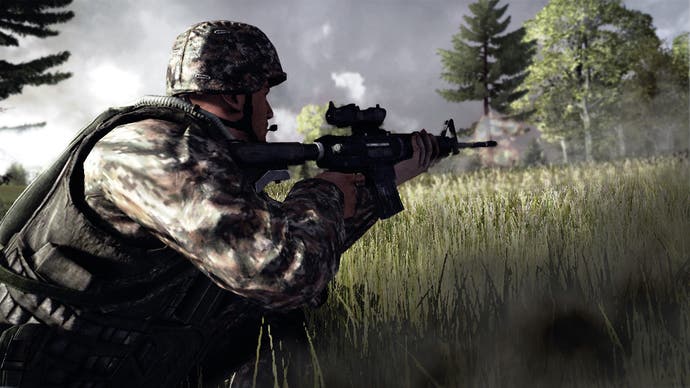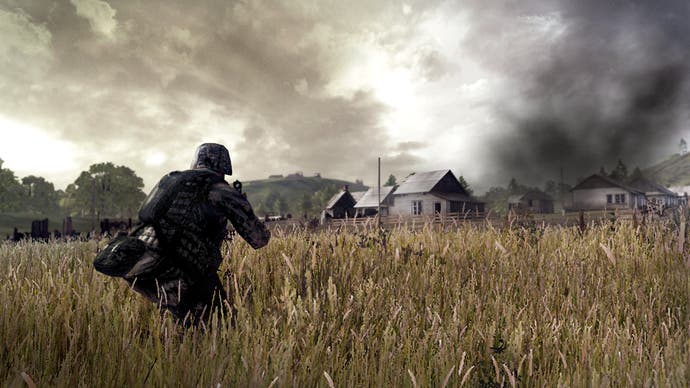Operation Flashpoint 2: Dragon Rising
We chat with lead AI designer Clive Lindop.
It's a complex game, and we didn't want to simplify it. It's always tempting for a publisher to go, 'Well, the original game had a hardcore audience so we'll simplify it.' We don't have to. If you make the learning curve literally visual, so that when you start the game you start as a private. I'm in command of an AI officer, and if you watch him fight, his tactics, and how he gives orders and what kinds of things he does, the player will naturally learn how to fight. So all this visual stuff has a practical aim.
If a 50 cal round hits you, you vaporise, and your arms come off! So health system-wise, you're dead! There's no hiding behind something while a ticker goes up. We have something called a Catastrophic Body Damage System - but there's a purpose to it. When somebody gets hit by a bullet, it hurts, and it does catastrophic damage to the body.
Quite often you'll hear people talking about OFP2 almost as an anti-war game. The experience you come out of it with is an appreciation of what absolutely massive balls the guys in Afghanistan must have, because it's a frightening experience but also shows how horrific war is.
If you get hit by a small round, say like a 9mm or a 5.56, and you've got body armour on and you get a wound, you can be stabilised - but you might suffer. You might get a limp. But there's no healing you up to full health again. Once you're hurt, you're hurt for the rest of the mission, so there is value in not getting shot.

That's what drives that adrenaline rush. If you sprint across a street, you know if you take one round you could be a dead man. So I've got to get my guy to lay down suppressing fire to keep the enemy's head down, and then I'm going to rush across. And when you make it across and kick the door down and you're in cover again, there's much more of a sense of imminent danger at all times.
One of the things the first game was quite famous for was that you could play it for two hours, and if you died, it was a case of, 'Sorry dude, start the mission again.' What? Did you save me anywhere? No! So, part of the difficulty setting allows you to be as masochistic as you want to be with yourself.
If you want that experience, which some guys do, it's one of those games where, like the first generation of MMOs where you had permadeath - some guys kind of like that brutality, and like the fact the game is very hard on you.
But in the sequel, rather than forcing the player to do one thing, if you just give them the choice and just want the experience of going through the campaign, don't do the hardcore mode. You can still have that sense of imminent danger, even if it's a bit more forgiving in terms of save slots. It's much more about giving the player that choice.

It's based on a real situation happening in the present day. There is a massive oil field underneath the island. It's something which could happen tomorrow - we really wanted to find something that's believable in the sense that if you wanted to read up about it online, you'll see it. We want that realistic documentary feel.
I don't know actually. I'm pretty sure we'd like to do one. It's really about trying to design a mission that allows us to do that. I'm pretty sure we will, because it's something that the original did very well, so I see no reason why we wouldn't - it's just not something I've seen on the schedule yet.
Because people have been waiting for so long we want something that shows, no seriously, not only is it real, but it does all the things that we're saying it does. GRID had very much the same arc... After three years of my life, it's going to do it!
Check back in the coming months for our first hands-on coverage of Operation Flashpoint 2. The game will be published by Codemasters in Spring 2009 and is coming to Xbox 360, PS3 and PC.

